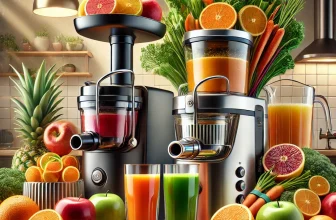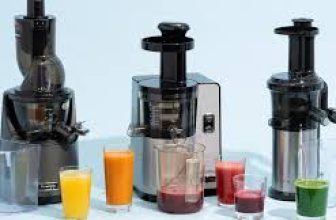As an Amazon Associate I earn from qualifying purchases.
Should I Buy A Juicer?
Should I Buy A Juicer? In an era where health-conscious living is trending, owning a juicer could be your ticket to a nutrient-packed lifestyle. Imagine being able to create a fresh glass of juice, bursting with vitamins, every morning. This modern convenience offers more than just a refreshing drink; it’s an investment in your well-being.
No products found.
Juicing dates back to ancient times, with civilizations recognizing its benefits. Fast forward to today, a study by the National Health Service found that juicing can potentially increase your fruit and vegetable intake by up to 64%. This means more antioxidants, fewer processed drinks, and a significantly healthier diet.

Should I Buy a Juicer?
Owning a juicer can lead to a healthier lifestyle by making it easier to consume essential nutrients. Freshly squeezed juice is brimming with vitamins and minerals that are quickly absorbed by the body. Imagine starting your day with a glass of fresh orange juice, packed with Vitamin C. Plus, you get to control the ingredients, ensuring no added sugars or artificial flavors. Many people find that juicing helps them meet their daily fruit and vegetable intake goals.
However, not all juicers are created equal. There are different types, such as centrifugal, masticating, and citrus juicers. Each type has its unique pros and cons, which can impact your juice quality and preparation time. For example, masticating juicers are known for preserving more nutrients. But they are usually slower and more expensive compared to centrifugal juicers.
Cost is another important factor to consider before making a purchase. While some juicers can be quite affordable, others are a significant investment. It’s also crucial to think about the long-term savings. By making your juice at home, you may end up spending less money than buying pre-made juices. Keep in mind that a higher quality juicer might last longer and deliver better results.
Maintenance and cleaning can affect how often you use your juicer. Some juicers are easy to take apart and clean, while others can be a hassle. Check if the parts are dishwasher safe to simplify the cleaning process. A well-maintained juicer will also function better and last longer. So, consider your lifestyle and how much time you’re willing to invest in maintaining the appliance.
Benefits of Owning a Juicer
One key benefit of owning a juicer is the ability to consume fresh, nutrient-rich juice whenever you like. Store-bought juices often contain added sugars and preservatives that are unnecessary. Freshly made juice retains more vitamins and minerals, giving you a healthier drink. For example, homemade carrot juice is loaded with beta-carotene and antioxidants. This can help improve your immune system and overall health.
A juicer allows you to get creative with your recipes. You can mix different fruits and vegetables to create unique flavors and nutrient combinations. This helps in making your daily intake of fruits and veggies more enjoyable. Many juicers also allow you to make other things like nut milk or frozen desserts. The versatility can add variety to your diet.
Juicing can also be a great way to use up leftover produce. Instead of letting fruits and vegetables go to waste, turn them into delicious juice. This not only reduces food waste but also saves you money. A juicer is especially useful for those who garden. You can juice your fresh produce right after harvesting for maximum nutrient retention.
Finally, owning a juicer can encourage better hydration. People often find that they drink more fluids when they have a variety of fresh juices available. Staying hydrated improves your skin, digestion, and overall energy levels. If you struggle with drinking enough water, flavorful juices can be a great alternative. This makes it easier to meet your daily hydration needs while enjoying delicious drinks.
Types of Juicers: Which One is Right for You?
Choosing the right juicer depends on your needs and lifestyle. There are several types to consider, each with its own advantages. Centrifugal juicers are the most common and affordable option. They work quickly, making them perfect for busy mornings. However, they can be noisy and often produce more foam.
Masticating juicers, also known as slow or cold-press juicers, work at a slower speed to extract juice. This method preserves more nutrients and enzymes. These juicers are quieter and produce less foam but are usually more expensive. They are ideal for juicing leafy greens and wheatgrass. Their versatility can also extend to making nut milk and baby food.
Citrus juicers are specifically designed for citrus fruits like oranges, lemons, and grapefruits. They are simple to use and clean, usually requiring minimal effort. These juicers are perfect if you mainly enjoy citrus juices. They come in manual and electric models. Manual ones give a great arm workout, while electric ones are quicker.
For those committed to the juicing lifestyle, twin-gear juicers could be a great choice. These juicers crush and press the juice out, retaining even more nutrients. They are usually the most expensive and require more effort to clean. However, they provide the highest quality juice. Their superior performance makes them a favorite among juicing enthusiasts.
The Cost-Benefit Analysis: Is a Juicer Worth the Investment?
The initial cost of a juicer can vary significantly, depending on the type and brand. Centrifugal juicers are typically the most budget-friendly, with prices ranging from $50 to $150. Masticating juicers tend to be more expensive, often starting at $200 and going up to $500. The most advanced models, like twin-gear juicers, can exceed $600. It’s essential to consider your budget and what features are most important to you.
When evaluating a juicer, consider long-term savings. Store-bought juices can cost $3 to $10 per bottle, with prices adding up quickly. Making juice at home can be more cost-effective. For example, buying a bag of carrots and a few apples is usually cheaper than purchasing a bottle of carrot-apple juice from a store. Over time, the savings could outweigh the initial investment.
Additionally, owning a juicer can contribute to a healthier diet, potentially saving on healthcare costs. Fresh juice is packed with vitamins and nutrients that can enhance your well-being. This might reduce the need for supplements and medication. Drinking fresh juice daily can help improve digestion, boost immunity, and even support weight loss.
Consider the additional costs of operating a juicer, such as electricity and maintenance. Some models consume more power, which can add to your utility bills. Regular maintenance, like replacing filters or parts, could also be a recurring expense. However, these costs are generally low compared to the benefits you’ll receive.
Time is another factor to think about. Juicing can require a significant amount of prep and cleanup time. Busy individuals might find it challenging to incorporate daily juicing into their routine. Yet, many people find the health benefits worth the extra time and effort.
Ultimately, the value of owning a juicer depends on your personal health goals and lifestyle. If you’re committed to consuming more fruits and vegetables, a juicer can be a wise investment. Not only can it save money in the long run, but it can also lead to a healthier, more vibrant life.
Maintaining Your Juicer: Important Tips to Keep in Mind
Regular cleaning is crucial to maintaining your juicer and ensuring it operates effectively. After each use, disassemble the parts and rinse them under warm water. Use a brush to scrub off pulp and residue from the mesh and other small parts. This prevents buildup that can hinder performance. Allow all parts to dry completely before reassembling.
Deep cleaning should be performed periodically, depending on how often you use your juicer. Soak parts in a mixture of water and vinegar to break down stubborn residue. For metal parts, use a mild detergent and avoid harsh chemicals. Inspect for wear and tear, replacing any worn-out components. Regular maintenance can significantly extend the life of your juicer.
Proper storage also plays a role in maintaining your juicer. Store it in a dry and cool place to prevent any moisture-related issues. If you have limited kitchen counter space, keep the smaller parts in a separate container. Always store the manual and warranty information in a safe place. They can be useful for troubleshooting or ordering replacement parts.
If you encounter issues, consult the user manual or reach out to customer service. Many common problems have simple solutions that can be resolved at home. For example, if the juicer isn’t turning on, it might just need a reset. Check the power supply and ensure all parts are correctly assembled. If problems persist, professional servicing might be necessary.
Routine upkeep not only maintains the performance but also ensures safety. Pay attention to any unusual sounds or signs of wear. A well-maintained juicer reduces the risk of malfunctions. This ensures you can enjoy fresh, delicious juice every day. Make maintenance a habit to get the most out of your investment.
Frequently Asked Questions
Here are some common questions people ask about juicers and juicing. These answers will help you understand more about how juicing can benefit your lifestyle and health.
1. What are the benefits of using a masticating juicer?
Masticating juicers work at a slower speed, which helps preserve more nutrients and enzymes in the juice. This results in juice that is richer in vitamins and minerals, offering better health benefits. Additionally, these juicers produce less foam and oxidation, resulting in longer-lasting freshness.
Another benefit is their versatility; masticating juicers can handle leafy greens, wheatgrass, and even make nut milk or frozen desserts. They operate quietly compared to centrifugal models but tend to be pricier. If nutrient retention and multifunctionality are your priorities, a masticating juicer is an excellent choice.
2. How often should I clean my juicer?
You should clean your juicer immediately after each use to prevent residue buildup and ensure longevity. Rinse all parts under warm water and scrub away pulp using a brush to maintain peak performance. Some parts may be dishwasher safe, which can simplify the cleaning process further.
A deep cleaning session is advisable every few weeks, depending on usage frequency. Soak parts in vinegar or mild detergent solutions to remove any stubborn residue or stains. Regular maintenance not only extends the lifespan of your appliance but also ensures safe and efficient operation.
3. Can I juice vegetables as well as fruits?
Yes, most modern juicers can handle both fruits and vegetables effectively. This flexibility allows you to create nutritious combinations packed with various vitamins and minerals from different food groups.
From kale to carrots to apples and oranges—juicing offers endless possibilities for flavor combinations that suit your tastes while boosting your nutrient intake significantly.
4. Do I need any special tools or accessories for my juicer?
While a standard brush is usually adequate for routine cleaning, some specific models may require additional accessories like replacement filters or extra storage containers. Check what accessories come with your machine when you buy it.
If you’re planning on making other items like nut milk or sorbets with specialized attachments available for certain models—they might be worth investing in too! Always refer back to the user manual provided by manufacturers for compatible accessories recommendations.
5. Is there a significant difference between cold-pressed juice and regular juice?
The main difference lies in how they are processed; cold-pressed juices use hydraulic pressure without generating heat, preserving more nutrients than traditional methods involving fast spinning blades that produce heat leading oxidization depletion quickly over time.
This means they have higher nutritional value overall longer shelf-life refrigerate properly due slower degradation rates via minimal oxygen exposure during extraction processes involved ensuring optimal quality output consumed days making them highly desirable among health-conscious individuals wellness enthusiasts alike despite comparatively higher costs associated production lingering perceptions enhanced benefits justifying expenses incurred typically displaying superior flavor profiles as well whenever sampled delight palate wonder’s wonders nature’s bounty nourishing bodies energizing lives positivity!
Final Thoughts
Investing in a juicer can be a great step toward a healthier lifestyle. With the ability to create fresh, nutrient-packed juices at home, you have control over what goes into your body. This can lead to better health, higher energy levels, and overall well-being.
By understanding the different types of juicers and their benefits, you can make an informed decision that suits your needs. From cost considerations to maintenance tips, being well-prepared ensures that your juicing experience is both enjoyable and beneficial. A well-chosen juicer can be a valuable addition to your kitchen, promoting a healthier you.

Maksuda Khanam is a passionate home appliance expert and the primary author behind KitchenMarts.com






